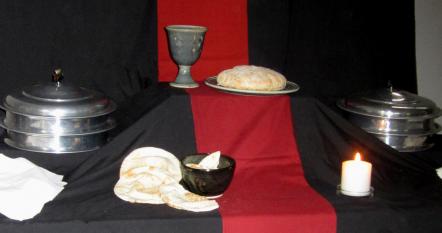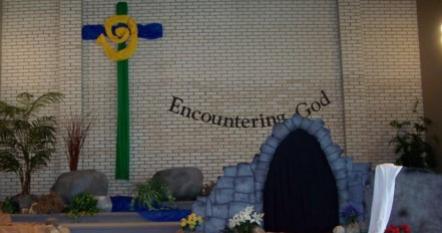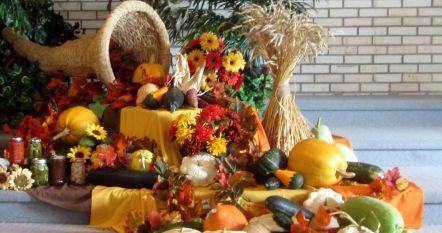Rosthern Mennonite Church
“Sorry seems to be the hardest word”
July 1, 2018
Craig Neufeld
In his very popular book, Anabaptist Essentials, author Palmer Becker, articulates that Jesus is the center of our faith, community is the center of our lives, and reconciliation is the center of our work. While the whole book is worth reading, and I believe we have it in the church library, it’s the third piece, reconciliation, which I want to spend some time on this morning, and not just because it’s Canada Day.
Paul’s Call
I tend to agree with Becker that reconciliation is the center of our work. Ideally, all that we do should be directed towards reconciliation in one way or another. But in reality, that’s not always the case. In our scripture reading today, Paul continues his argument about reconciliation to Corinthian church, which he started a chapter ago. Paul highlights reconciliation as the key ministry that we’re called to. He also highlights that it’s not a very popular ministry.
Beginning in verse four and continuing on through verse 5, Paul lists a number of challenges that those pursuing reconciliation often face. Starting with generalities, and moving onto specifics, Paul is no doubt reflecting on his own experience as one who pursues reconciliation. It has led him through tough times, it has required great endurance. For the good news of God’s reconciliation has led him to endure imprisonment, beatings, riots, sleepless nights, and even hunger, but through it all Paul endured, and continues on to preach his messages knowing and trusting in the importance of his calling.
Paul knows first hand the skepticism that reconcilers are faced with. In verses 8 through 10, he describes the different ways that the world views those seeking reconciliation. While the world my see them as imposters, reconcilers are true of heart, while they might not be known by the world, they are also well known for what they’ve accomplished, while they might be dying to the world, they are truly alive, they may be punished by the world, but are never killed, be working in places of hopelessness, but still manage to find joy, may be poor to the eyes of the world, but are rich in other ways, and may appear to have nothing, but in reality poses everything that matters.
And it’s because of these contrasts that I think it’s worth our time to spend at least a little bit thinking about reconciliation in our lives. Which is why I think Palmer Becker is a helpful voice for us to listen to. In looking at reconciliation as the center of our work as Anabaptists, Becker breaks it down further suggesting that there are three areas where Anabaptists work at reconciliation, first between us and God, secondly between each other, and thirdly in areas of conflict in the world.
…with God
So first, between us and God. Becker writes:
“While some followers of Christ say evangelism is at the center of our work, others say peace-buliding is most important. In truth, both evangelism and peace-buliding are essential…These two aspects of the Christian faith are brought together in the word reconciliation. Reconciliation has to do with restoring relationships. It is the bringing together of person, ideas, or accounts that have been in conflict. Reconciliation assumes that at one time fellowship existed; however an offence took place that brought about estrangement and perhaps hostility, which needs to be resolved.”[1]
This is our starting point. And this is why, in reconciliation we begin with reconciling ourselves with God, or as we probably more commonly understand it, as salvation. When we consider “individual salvation, it is not God who needs to be reconciled to us, or to make a decision. God has not sinned or offended us, but rather has always longed for a loving relationship with each of us. It is we who have erred. We need to be relationally restored to God and God’s will.”[2]
“Mennonite historian C. Arnold Snyder says ‘In my view the heart and soul of the Anabaptist moment is found in its understand of salvation.’ Anabaptists understand salvation in terms of reconciliation and transformation. To be saved means to be reconciled to God and God’s family. As we are reconciled to God, as known in Christ and Christ’s body, we are transformed in how we think, feel and act.”[3]
So our salvation is more than a singular act, in fact, our salvation is an ongoing thing, we we continue to reconcile ourselves with God and Christ, we continue to be transformed, in our thoughts, our feelings, and our actions. This is why, for me at least, one of the strengths of the Anabaptist Church is how we’re regularly asking the question of ‘how shall I live.’ Our reconciliation with God, is an ongoing thing, something that we’re continually called to. And as Paul aptly recognizes this isn’t easy work, but I would agree with Becker that this is essential work.
… with Each Other
At the same time that we’re working on reconciling ourselves with God, we’re also at work reconciling ourselves with each other. Notice I didn’t say after, I said at the same time. This work of reconciliation is happening concurrently, at the same time.
In the lake 70’s Elton John released a single entitled “Sorry seems to be the hardest word.” In the song he laments a gulf that has developed between him and an unnamed lover. He sings:
What have I got to do to make you love me
What have I got to do to make you care
What do I do when lightning strikes me
And I wake to find that you're not there
What do I do to make you want me
What have I got to do to be heard
What do I say when it's all over
And sorry seems to be the hardest word
It's sad, so sad
It's a sad, sad situation
And it's getting more and more absurd
It's sad, so sad
Why can't we talk it over
Oh it seems to me
That sorry seems to be the hardest word
I think that there’s more than a kernel of truth to be heard here. When relationships have been broken, when conflict has arisen, the first step, is saying ‘sorry.’ And more often than not, even though we’re Canadians, sorry really is the hardest word.
So often when we find ourselves in conflict with someone else, we want to find ourselves on the side of right. Very early on, in many, any conflict, we want to clearly delineate who’s right and who’s wrong. We set up camps, we side with one or the other, and then we begin defending our positions. This does not lead to restoration of relationship, in fact, it leads to a further fracturing of relationship. And this is something that the Church, any church, needs to continue to work at, because we’re not immune to this polarizing kind of thinking.
As Anabaptists, our starting point in a conflict should not be to decide who’s right or wrong, it should be, in as much as possible, directed towards restoring relationships, reconciliation. By doing so, we model to the rest of the world, that in times of conflict, ‘winning’ isn’t always the best solution. That perhaps the restoration of relationship is a nobler goal.
…with the World
And so finally, while we’re busy working on reconciling ourselves with God and with each other, we’re also called to work at reconciliation in the world. This is where it’s quite appropriate that we’re reflecting on this on Canada Day. I was struck last year, in the midst of Canada’s 150 celebrations listening to indigenous voices lament how this is not their country, nor their celebration. And it reminds me that me of just how far we have to go as far as practicing reconciliation with our indigenous neighbours.
While good steps have been taken, while the Truth and Reconciliation Commission has delivered their report as well as their calls to action. While the United Declaration on the Rights of Indigenous Peoples has been passed by the House of Commons and is awaiting senate approval, and while there is increasing awareness, there is still much work that needs to be done.
It’s going to take a great deal of work to mend relations with the United States, especially now that the US and Canada are in the midst of a trade war. And even though Canada is involved with Peacekeeping work in Mali, we’re still peacekeeping with firearms. The world needs more than peace keepers. And Canada isn’t the only place in the world that needs reconciliation. I could begin a list of places of conflict in the world, but sadly, we’d be here for a lot longer today. The world needs people willing to do the hard work of reconciliation.
And reconciliation is not just in the realm of politics, the Church needs it too. There are both ancient, historic gulfs, and recent schisms that have broken apart God’s church. And the Church needs to be willing to do the work to right those relationships.
Reconciliation as the center of our Work
The last verse of our reading today, speaks to the necessary beginning of reconciliation: “open wide your hearts also.” All of what I’ve talked about today isn’t possible unless our hearts are open, to God, to one another, to the conflicts of the world, and as well to the transforming power of the Holy Spirit. For reconciliation to be not just our ministry but the centre of our work as Anabaptists, it requires that we have open hearts, willing to lay bare our short comings, to love our neighbours, even if it hurts us, and to ache and to respond in the face of the worlds conflict.
It means a willingness, to embody what Paul affirms, that by purity, knowledge, patience, kindness, holiness of spirit, genuine love, and truthful speech, we live out reconciliation in our lives, with God, with each other, and with the conflicts of the world. On this day of celebration, may we also remember the places in our lives, our communities, and our world which needs God’s reconciling presence, and may God open our hearts to the necessary transforming work of the Holy Spirit.
Amen
[1] Becker, Palmer. Anabaptist Essentials: Ten Signs of a Unique Christian Faith. 2017. p. 111-112.
[2] Ibid. p. 112.
[3] Ibid. p. 113.
--------------------------------------------------------------------------------------------------------------------------------------------------------
Rosthern Mennonite Church
"Gluttony - Temperance"
Krista Loewen
February 25, 2018
PART ONE
The stereotypical glutton comes to the table ready to eat until they can eat no more. The results of which John Crysostom describes as “discharge, phlegm, mucus running from the nose, hiccups, vomiting, and violent belching… the increase in luxury is nothing but the increase in excrement.”(Rebecca Konydyk DeYoung, Glittering Vices: A New look at the Seven Deadly Sins and Their Remedies, 139.) St Thomas Aquinas adds to the list: excessive and unseemly joy, loutishness, uncleanness, talkativeness, and an uncomprehending dullness of mind.” That is quite a
deadly image indeed. This spiritual offence, however, is rarely talked about in our circles. No one wants to be labelled as a glutton or point the finger at another for carrying a bit too much weight around their hips. Well I am here to ease your mind: we are all gluttons. There is no need to be shy about what our bodies look like for the root of this sin is far deeper than the amount of food we put into our mouths. Instead, it looks at where we seek pleasure. Lust and Gluttony are linked in that they are the only 2 of the 7 deadly sins related to our body’s functioning. And so it is not surprising that both speak to that which gives us pleasure. It is said that the most necessary things in life, that is sustenance and procreation, were designed to give us the most enjoyment from God. Whether fat or thin, wide or narrow, or somewhere in between all of the body types, there lies a glutton. I came across a helpful acronym to outline the 5 types of gluttons: FRESH
F stands for Fastidious eaters. Gluttony can be rooted in an attitude that is overly concerned about the accuracy and details of the meal. These gluttons “arrive at the table focused on their expectation of getting a certain pleasure and with an equally focused determination to do whatever it takes to get it.”(Rebecca Konydyk DeYoung, Glittering Vices: A New look at the Seven Deadly Sins and Their Remedies, 139.) The revealing test is if the experience of eating is spoiled for you when it isn’t want you expected. When David and I were in BC celebrating our anniversary, I planned a romantic morning date for us. We were to go to Starbucks, buy a newspaper and enjoy it on the patio looking out onto the wonderful scenery. However I am particular. I had a specific vision of what I wanted to drink that morning. A cappuccino made from whipped cream with a sprinkle of brown sugar on top, in a ceramic mug. Starbucks plays into fastidious gluttony: you can order your drink exactly the way you like and return it if it isn’t right, no questions asked. So i ordered my whipped cream cappuccino with brown sugar in a ceramic mug. And what did I get? A whipped cream cappuccino with brown sugar in a paper cup. I was devastated. In my mind the whole morning was ruined because the foam of my drink would be stuck to the paper. I was still with David, the newspaper, the beautiful outdoors and drinking Starbucks. I was overtaken by gluttony in that moment. My desire for the perfect meal overshadowed my enjoyment of the experience.
William Willimon writes that “The fat guy in the tee shirt, swilling vast amounts of beer with buffalo wings, is surely no more disgusting than the priggish person, daintly observing, sniffing and picking over his food.”(William H. Willimon, Sinning Like a Christian: A New Look at the 7 Deadly Sins, 25.) Fastidious gluttony highlights our propensity to value the particularity of food more highly than bodily sustenance.
S stands for eating Sumptuously. It is defined by the preoccupation with fullness and splendid looking food. Most often this means eating rich and filling things (bring on the butter and pasta please!). While in Korea, David and I ate the most
gluttonous meal I have ever experienced. The Michelin star restaurant featured 7 courses of food, each expertly prepared, highlighting different flavour profiles and intricate presentation. I enjoyed every minute of the meal. When I started to read about sumptuous gluttony, however, I remembered that this meal was overly concerned with being splendid and expensive looking. The Food Channel is one of the most widely watched TV programs. When does a concern about good food become too much of a concern? With modernization of food preparation and storage, our society has turned the preoccupation of what we will eat next to survive into a fetish in the kitchen.(Henry Fairlie, The Seven Deadly Sins Today, 159.) Sumptuous gluttony highlights our propensity to see food as something created for our singular pleasure. Hasty eating is a more familiar image of a glutton. It is easy to imagine someone shovelling food into their mouths without the ability to slow down or take in their surroundings. Our dog, Lucy, has mastered the inhalation of another dog’s kibble. She struggles to fit in another gulp before chewing the previous one. She embodies the words of Ecclesiastes 6:7 “All human toil is for the mouth, yet the appetite is not satisfied.” These words serve as a warning by using language similar to other biblical texts. It harkens back to depictions of rich oppressors ready to consume humanity with an insatiable desire and brutality. Our propensity to focus on the pleasure of our guts represents deadly social, even cosmic, repercussions.
The Excessive over eater eats past the feeling of fullness to indulge the senses. They do not intended bodily harm, but are willing to take the risk in order to experience a new flavour. They are the person who says, “I am so full but I can’t resist having just one more!”(Konydyk DeYoung, 144.) Excessive overeaters are allured by the promise of pleasure. Lastly, The ravenous eater is one who is overcome by greed at the table. Imagine a family supper table with 3 hungry teenage boys all sitting down after a long hockey practise. They jockey, push, and shove, eating quickly to ensure they have an opportunity to eat seconds before their brothers. Ravenous gluttony highlights our selfish interests.
Gluttony paints an undignified image of human behaviour. When we are overcome by hasty, greedy, excessive and self-pleasuring eating we become hunched over the table like an animal. This starkly contrasts the embodiment of a
created and loved child of God. “If there’s anything simple about gluttony, it is its focus on pleasure. One’s own
pleasure. Excessive pleasure. Immediate, tangible pleasure.”(Konydyk DeYoung, 139.)
Eating is meant to be pleasurable but it becomes gluttonous when our desire for food runs out of control. It isn’t so much about what our bodies look like, or whether we are acting politely at the table, but whether we are consuming resources to satisfy our own wants above all else. The act of gluttonous eating distorts what we are really hungry for.
Gluttony is the opposite of godly contentment. When we get caught in the “futile cycle of avoiding spiritual starvation by indulging ourselves physically,” we eventually lose sight of what other types of fulfillment feel like. it becomes the only type of satisfaction gluttons know. Gluttons “are left with a hollow at the core.”(Fairlie ,171.)
Food is often misused as a coping mechanism for stress, lack of rest, or joy in our lives. Food provides the euphoric hit of a drug in moments when we need a quick fix. Within our cultural milieu of instant gratification, food is an easy solution. This is often referred to as emotional eating in women’s dieting circles. Abusing food only provides a temporary sense of satisfaction because it is simply a material fix. The things causing us to feel overwhelmed, stressed, and out of control, are deeply rooted in our souls: the inmaterial. Fredrick Buechner describes a glutton as “one who raids the icebox for a cure for spiritual malnutrition.”(Fairlie ,171.)
This is the nature of sin: it takes something ordinary and elevates it to a level of importance which blinds us to the beauty and simple pleasure in food that is around us. Our feelings wrapped up in the topic of gluttony are complex. When I imagine the overweight monster, I feel most uncomfortable with their being overweight. The repulsive thing is the fat, not the sin. As preachers we haven’t needed to preach against gluttony since there is enough shame for those who overeat on a daily basis. “The sinner who commits lust can go about his or her way secretively forever and never be found out. But the glutton is exposed for all to see… [this] certainly suggests that we are much more concerned with externals than internals, that we care more about the state of our waistline than the state of our souls.”(Willimon, 128.)
Elna Baker is one of those people who has lost a lot of weight, 110 lbs to be precise. Before losing the weight she denied that it was affecting her future. She had dreams of having a boyfriend or being an actress but continually felt
roadblocks along the way. Eventually she lost the weight and a whole other world for thin people opened up Suddenly men were interested in her. She was seen as a nicer person. All she had to do was not eat. However, “It wasn’t enough to lose the weight of an entire adult woman.” Her mental health wasn’t addressed and was left deeply troubled by the dichotomy in treatment she received. She had been taking phentermine, a weight loss pill, that she brought from Mexico, in order to maintain her weight. She recollects “I tell people that I have insomnia but really I am on speed. And I am on speed because I need to stay thin. I need to stay thin so I can get what I want… I don’t like what I am but I’ve accepted it as part of the deal. “(Elna Baker, This American life, Act Two: “ It’s a small world after all,”
https://www.thisamericanlife.org/589/tell-me-im-fat.) Elna Baker is willing to drug herself because our society is more concerned with the external than the internal. Our gluttony highlights our pride and obsession with our bodies in ways that are disordered. On one hand we are told to treat ourselves with the most luxurious food available on the Food Network. But, if you overindulge, and end up like poor fat Elna, shame on you. This vicious cycle of gluttonous desires and obsession with body image further removes us from intimacy with God who created us in her image.
It is easy to lay the blame and sin on the hands of those that create the system. But as Christians, the root of the sin isn’t the system but our own guts. Our pursuit of excess pleasure in food isolates us from the beauty in a shared meal. It forces us to feel guilt and shame about our bodies but addicts us to the very thing that brings us shame. We are left hollow and “full of hungers that we attempt to satisfy in ways that bring us, our neighbor, and God to grief.” We are, by our nature, sinners…. Sin is not some alien force, some demonic possession. Sin looks like me.” (Willimon, 136.)
PART TWO
Temperance is suggested as the foil to gluttony. If we eat in temperate ways, we should be rid of our sin. I have three
suggestions of temperate eating for you to consider. First, eat in a way that contributes to your overall health and well-being. It’s not my job or in my training to teach you about nutrition, but I think we all know the basics: stop eating when you’re full, eat your vegetables and fruits, and enjoy desserts sometimes! If our eating is disordered, this “mistreatment of the body- by excess or deficiency - demonstrates a flawed sort of self-love” (Konydyk DeYoung ,150.) Choosing to love and respect our bodies by fuelling it with what it needs is one of the best ways to practise self acceptance and rekindle our physical connection with God. Eating only what we need also helps keep the Hasty, Excessive and Ravenous glutton in check.
Secondly, our eating should take into consideration the needs of others. This includes our immediate family, communities and creation. Eating is designed to be a social act. When gluttony rules our habits it gets in the way of our appreciation and care for others. This anecdote from a Nigerian family demonstrates this: “The eldest child would be served first and given the largest helping. That child had to eat slowly enough, however, that if a younger child who finished first was still hungry, that younger child would be served seconds off the eldest child’s plate. The eldest child’s
seeking of the pleasure and fullness of eating was thus always disciplined by and responsive to the needs of others eating with them.”(Konydyk DeYoung ,151.)
Gluttony also affects our neighbours. If we continually eat in ways that only benefit ourselves we leave many people vulnerable. Lazarus and the rich man is my favourite biblical example of this scenario. There was a rich man who lived in luxury every day. At his gate laid a beggar named Lazarus longing to eat what fell from the rich man’s table. When both men die, the rich man is chastised for ignoring Lazarus’ needs. While he gorged himself in the finest, sumptuous, pleasure, Lazarus yearned for just a small portion of this.
This story is one of Jesus’ most direct parables and teachings against gluttony. Jesus did not preach against overeating. Jesus’ primary concern was how our eating affected our brothers and sisters. This might mean a bit of personal suffering for the sake of those around us. Jesus doesn’t bless the overzealous but the persecuted. Those who suffer for their
beloved’s sake and choose to eat less so that all may have some are the embodiment of the beatitudes.(Jeff Cook, Seven: The Deadly Dins and The Beatitudes, 150.)
In our context it is appropriate to extrapolate the sins of gluttony and apply them to all resources we consume. In a time when shortages of raw materials are commonplace many still continue to consume recklessly. Take for example the water shut off in Cape Town, South Africa. Three consecutive years of drought severely reduced their water reservoirs to levels, which are unsustainable. It is projected that by April 16th the water will be shut off in the whole city. In Cape Town inequality runs rampant. New vineyards continue to be opened and place a serious burden on water supplies. While the poorer neighbourhoods are nervous about the government fulfilling their promise of bottled water, “Wealthy homeowners
have drilled boreholes and invested in water tanks so they have an independent supply...Some residents have called environmental groups to complain their neighbours are filling swimming pools.”(Jonathan Watts, “Cape Town Faces Day Zero: What Happens When the City Turns Off the Taps?” https://www.theguardian.com/cities/2018/feb/03/day-zero-capetown-turns-off-taps) This is gluttonous consumption of our resources. If we fill our plates and swimming pools without consideration of how our consumption is connected to others, we choose to ignore the injustices that YHWH and Jesus both condemned. “Whereas Marie Antoinette said, ‘let them eat cake,’ Mary sang at Jesus’ birth about a saviour who would ‘fill the hungry with good things’ Luke 1:53.”(Willimon, 123.)
My last tip for temperate consumption is to eat in remembrance of our vocation.If it is our goal to be in the world but not of the world, how does our dinner table reflect this? Choosing food that supports local markets, ecological stability, reduced waste, and moderate consumption of limited resources, such as fish, can set us apart in the grocery line. In doing so we pursue health in the whole person (mind, body and soul), rather than being a slave to our pleasure centres.
Fasting is one way to consider how we fuel ourselves for our spiritual journey. Jesus fasted in the desert to prepare
himself for what was ahead. Isaiah 58 clearly outlines what kind of fasting we should participate in: “Is this not the fast I
choose: To loose the bonds of injustice, to undo the thongs of the yoke, to let the oppressed go free… Is it not to share your bread with the hungry, and bring the homeless poor unto your house… Then your light shall break forth like the dawn, and your healing shall spring up quickly… if you offer your food to the hungry and satisfy the needs of the afflicted… The Lord will guide you continually, and satisfy your needs in parched places… and you shall be like a watered garden, like a spring of water, whose waters never fail.” Isaiah was written in the context of what is right and wrong worship. Right worship and fasting is that which rejects oppression and changes what is on our dinner table: share bread with the hungry, offer food and satisfy their needs. The words of assurance ring clear, if we physically fast from that which controls us, we will be guided and prepared to bring light and healing to the nations.
Lent is the Christian season of fasting. Fasting itself does not need to be a violent undertaking. It does not seek to “do
violence to the body but rather restore it to health and equilibrium.The purpose of this [fast] is to lead us in turn to a sense of inward brokenness and contrition; to bring us, that is, to the point where we appreciate the full force of Christ’s statement, ‘without me you can do nothing.’” (Konydyk DeYoung ,156.)
Participating in the communion feast also trains us for what we spiritually need. Just as the Olympians in Pyeong Chang pay special attention to how many calories they need to keep their bodies in prime physical condition, we too as Christians need the drink of wine and small taste of bread, as fuel for the journey ahead. It is not a large enough portion to engorge ourselves. But by offering a celebratory drink of wine, the communion table lays a feast ahead of us, ready to celebrate Jesus’ resurrection and victory over death. Often when you hear of a new diet it relies on will-power and self control. It promises that if you just avoid eating all carbs for 30 days, you’ll lose the weight you’ve always hated around your hips. The problem with the technique is that will power is a limited resource. Eventually we run out of steam and our ability to stay away from carbs diminishes. Successful long term diet change plans more often talk about going slowly and addressing the root causes of why you turn to food for pleasure. It is only once we recognize where our souls are hungry, and satisfy that hunger, that we will be able to make long term changes to our gluttonous appetites. Simply choosing to be temperate at the table will not succeed on will power alone. Let us put our mouths in the right place
and pray “ O Lord, open thou my lips and my mouth shall show forth thy praise.”(Fairlie ,170) May our mouths be used for praise and righteousness, rather than a gluttonous fix, so that we may draw nearer to the love and acceptance of God.
-----------------------------------------------------------------------------------------------------------------------------------------------------------------
Rosthern Mennonite Church
“Stuck in the Past or Remembering the Future”
Craig Neufeld
September 10, 2017
Introducing Gratitude
Something I’ve been trying to work at for the last little while has been to foster an attitude of thankfulness, gratitude. Growing up I was always reminded to say please and thank-you. My aunt, was always told to say the ‘magic’ word but because she could never figure out which one people were looking for she developed the phrase “please-thank-you-god-bless-you-amen” to try and cover her bases.
As a culture I think we’re not as grateful as we used to be. I think, gratitude as been replaced with a sense of entitlement. And I’ve noticed that if I’m not deliberate about it, I don’t express my gratitude very well, and I can take people and actions for granted.
Introducing the things that get in the way of Gratitude
For the next few weeks, when we don’t have a special service, we will be looking at the things in our lives which get in the way of us being grateful. Those things that inhibit us from showing gratitude. Those things which prevent us from being gracious people.
We’re going to spend time considering things like Nostalgia, a kind of sentimentalizing the past, worry, something that I think we all do, entitlement, an attitude which prevents us from recognizing the broadness of God’s grace and love, greed, and disappointment.
We’re going to reflect on all these attitudes, whether we recognize it or not, which get in the way of us being able to see the generosity of God around us, and our own calling to be a grateful and gracious people.
So this morning we’re going to begin with an attitude which I think we all need to fess up to. Nostalgia.
Jacob
So a story for us:
Jacob’s feet hurt. His stomach grumbled, and his lips were cracked. He wasn’t used to living like this. He wasn’t used to the dryness, the heat, the sun beating down on him. He wasn’t used to walking this much. It didn’t feel much like walking it was more like wandering, at least that’s what he thought. They’d been following Moses for some time now. The first while was exciting, they had left the city in the midst of a celebration. Or at least they were celebrating. The Egyptians, the ones who had owned them, the ones who had enslaved them, weren’t very impressed with Pharaoh’s command to release the Hebrew people from slavery. But Jacob and his family and all the other Hebrew slaves were pretty excited. That was the first day, the second day was exciting for a different reason, Pharaoh had changed his mind, and had sent an army to capture them. And they were trapped between Pharaoh’s army and the Red Sea. But Moses got them through that, and the people were excited and they celebrated, but now it was different, it wasn’t exciting anymore, the novelty of a ‘wilderness camping’ trip had worn off. Their water had run out, and they were down to rationing the food. No one was celebrating anymore, in fact, people were starting to complain.
They were complaining because they weren’t sure that Moses knew what he was doing. It almost seemed like Moses was just as lost as they were, and worse yet, it looked almost like Moses had brought them into the wilderness to die.
While wandering Jacob began to remember the nice food that his master used to have laid out on the table each time he came in to clean up. He remember the ripe fresh fruit, he remembered the seemingly bottomless carafes of water and jars of wine. He remembered the shelter that he had over his head. He remembered how comfortable his shoes were, not worn out like these ones. Was it that bad in Egypt? Looking back on it now, it wasn’t that bad, he was very tempted to go back, or, at the very least join in with the others complaining. Moses had promised them freedom, a land of milk and honey, and instead…instead Moses was leading them to almost certain death in the wilderness.
Now Jacob was beginning to get bitter, he could feel his anger welling up inside of him. Why did he ever leave Egypt? He had it so good there, it wasn’t nearly as bad as this.
Just then, he stumbled, his foot caught a rock and he tripped, and fell face first into the hard desert ground. Just as he was about to say a curse and scream out of frustration, he was picked up by two neighbours and offered some water. And it was then that he realized how crazy he was. What was he thinking, “Back in the good ol’ days, when we spent all day making bricks for building pyramids, when we had no rights, when we couldn’t stand up for ourselves, when Pharaoh occasionally killed us, THOSE WERE THE DAYS?!?!” My goodness.
Jacob began to laugh at himself, sure this is tough living, but it’s living and not slavery. And that makes this better than where we were.
Nostalgia
There’s a saying that goes, yesterday is behind us, and it’s called the past, tomorrow is ahead of us, and it’s called the future, and today is a gift, that’s why it’s called the present. It’s a challenge to live in the present. Or at least it is for me, my mind is either thinking ahead of what the next project is, or trying to figure out that one puzzle, or I catch myself dwelling on the past, sometimes reliving situations and regretting that I didn’t act, behave or respond a particular way, or I find myself romanticizing the past, remembering the good bits, and selectively forgetting the not-so-good bits.
And I imagine that some of you might catch yourself from time to time in a similar situation. We call can be caught up in remembering the past, or even romanticizing it. Sentimentally focusing on the highlights.
The Problem of Nostalgia
The problem with Nostalgia is that never leads us forward. It’s a candy-coated, much improved rendering of what once was. And the present in which we find ourselves can never live up to such an idealized past. Nostalgia can leave us stuck in the quicksand of our own edited memories. And we can find ourselves perpetually ungrateful for the place we find ourselves because it doesn’t match up with a glorified past which we remember.
Nostalgia most acutely manifests itself in churches as an idealized memory of the church as it once was. And we’re not immune here. I hear it when people lament that we’re not the church of 400 people that we once were. I hear it expressed that it was so nice when there were so many young families here. I hear the deep longing to return to how things were. I hear a sadness of how we are not what we once were. And I can feel that sadness that grief. And when we give in and hold onto these memories that this is how the church should be Nostalgia quietly steals our joy away, and it prevents us from seeing the ways that God is at work around us right now.
Sometimes we need an abrupt reality check to open our eyes to what is present, and what is our own idealized fiction of the past.
When I look at the church ledger, our records show that we were at our largest with over 415 members in 1975, six years before I was born. And a lot has changed in since then, and you’re right. The church isn’t was it what it once was, it’s different now. And you’re right, when we used to have so many kids. And when we had so many young families, the church was a really vibrant place to be, there was a lot of energy, there was a lot of activity, and it made it easy to come to church. And you’re right. It’s not like that anymore. And it’s sad, it’s tough. But living longing for that memory, living hoping for the return isn’t living, it’s something else.
Peter
In our gospel reading, following the resurrection of Jesus, Peter, the disciple who denied Jesus, tried to go back to what he knew, he tried to go back and be a fisherman. Either it was out of a sense of guilt, or out of a sense of shame, or maybe it was just because Peter didn’t know what else to do, Peter decided to go back to the one thing that he knew how to do, the one thing that he knew he could make a living from. Peter decided to fishing. It’s like he needed that memory of the familiar, he needed to live out some of the happy memories to replace the sad reality that he was living. But it didn’t work. Peter was faced with the ugly reality that he wasn’t the fisherman that he remembered himself being, instead of catching a bursting net-load of fish, Peter got skunked on his fishing trip, that is, at least, until Jesus appears.
If you read on from where our scripture reading stopped, you’ll notice that Jesus doesn’t allow Peter to continue on living out of the past. Instead, Jesus offers Peter, redemption, and a new calling in life. Three times Jesus asks Peter if he loves him, mirroring the three times that Peter denied Jesus, and this time, three times Peter confesses that he does, and each time, Jesus commissions Peter to feed his lambs, to tend to his sheep, and to feed his sheep. Jesus offers Peter a new calling, Jesus offers Peter hope, a new future to look forward to.
Remembering the Future
As followers of Christ, we must also live as a people of hope, a people who remember a future. It sounds a little silly to say, it might even sound a bit confusing.
However, as followers of Christ, we are a people who are remembering the past actions and promises of Christ, and living with those past actions and promises as we gaze ahead to a unknown future , but a future that has Christ as our cornerstone. But this past and future living is difficult, because the temptation is always there to remain in the past, remembering the ‘glory days.’
Remembering the future, and living with hope doesn’t mean that we forget how things once were, it doesn't mean that we have to get rid or not acknowledge those memories. What it means is that we remember and appreciate how things once were, and know that God has something just as good in store for us. In a way it’s an act of trust, trusting that the future, which we don’t know, is going to be just as good as the past that we remember fondly.
Remembering the future means making a different decision than the Israelites did, and not remaining stuck thinking that Egypt was better than the wilderness, and instead, being more like Peter and accepting Christ’s grace, and Christ’s calling for who we could become.
When we live with one foot in the glory days of the past it’s difficult to see fully how God is at work around us. And yet, if we can be courageous enough to allow the past to be the past, and cast our gaze around us, perhaps we can notice the work of the Holy Spirit, and the evidence of God with us as we strive to be the Church in Rosthern.
Amen.
-------------------------------------------------------------------------------------------------------------------------------------------------------------------
Rosthern Mennonite Church
“Faithfulness: Living into God’s Kingdom”
September 3, 2017
Craig Neufeld
Sometimes, coming back from holidays is the hardest part. When I prepare to go on a trip or a vacation there’s usually excitement and anticipation. Putting together a packing list, thinking about all I’m going to need, and figuring out whether or not it will fit gets me excited for the adventure to come. And then…well, and then it’s soon time for the holiday to end and for me to pack back up and come back home. Except when you return home, you’re not the exact same person you were when you left.
Returning from a short canoe trip this week I found myself struggling to return, it could be because it was too short a trip, or it could be because it was so different than my usual rhythm that I was a little disoriented, whatever the reason, I struggled to return; to come home. And I found myself asking questions. After living out of a 60L barrel, I was wondering, do I need all the stuff I have at home? After being so mindful of my waste, I started to wonder what habits or things could I do differently at home? And after living with a different rhythm, I was wondering, what changes could I make at home? I had come back from my trip a little different than when I had left.
When we come back from trips, and many of us have, or are doing this in the next week or so, we’re changed. We’re different, we’ve seen and lived and experienced new and different things. We’ve might have seen different parts of the world, or maybe experienced a different way of living. Familiar routines are interrupted and replaced with different routines. We become changed.
So at the end of summer I want to reflect a little on this change. We’ve spent the last 6 weeks, and a few before then thinking about creation care, and we’ve learned some new things. We’ve heard a variety of voices reflect on God’s creation and our call to care for that creation; to treat it gently, to not exploit it. Today, our scripture from Isaiah grants us a glimpse of God’s kingdom, and our scripture from Romans, draws our attention to the groans of creation. And we’re called to hold onto both as we explore our final fruit of the spirit, Faithfulness.
Faithfulness
As I see it, when I think of faithfulness in relation to the care of God’s creation, I can’t help but wonder how it’s connected to the other fruits we’ve reflected on this summer. I think faithfulness, or at least faithful living, is tied into each of the fruits that we've explored.
A common question connected to creation care that I’ve been hesitant to answer, has been the “What do we do about it?” question. I’ve been reluctant to offer an answer for a couple of reasons, first, I want you to think about it, and maybe come up with your own response. Secondly, because I don’t feel good prescribing how to ‘fix’ a problem like climate change, and thirdly rather than jumping to a solution, I’ve wanted us recognize our role in creation care and climate change,.
Now that we’re onto talking about faithfulness, and faithful living, I think it’s come time to answer the question, ‘what can we do about it?’ or to phrase it another way, “How do we live faithfully into God’s kingdom?” And I think that living faithfully into God’s kingdom is embodied in all of the fruits of the spirit which we have talked about this summer. Faithful living is not isolated from other practices, rather it’s a combination of many practices.
Peace
So how is it that we can live faithfully into God’s Kingdom, firstly, Sabbath rest, for both creation and for us. When we talked about peace last week, Krista focused on Sabbath, and reminded us how the Sabbath creates a distinctive community, a community of peace. She also talked about how Sabbath expands our community because it shapes us as a people. While the rest of society might prefer to run at a 24/7 pace, God has assured us that there is enough grace for us to take time to rest, whether that’s once every seven days, every seven years, or seven times seven years.
Creation needs a rest, whether it’s from being used, or from being exploited. Creation and humankind also need a rest from many of the ongoing conflicts. We need to find and foster peace with ourselves, peace with creation, and peace with our neighbours, whether they be nearby or far away.
So what does or can that look like? What might it look like for you to rest one day a week? Maybe it means finding for yourself a place to retreat to, a place where you can be still and know that God is. For me that is what the wilderness is, it is a place where God is, and where all of my defenses are stripped away, and I am completely vulnerable to God and God’s creation. And, interestingly enough, it’s a place where I feel relaxed.
It’s important for us to remember that Sabbath is just as important for creation as it is for those who dwell within God’s creation. As much as we need rest from work, so too do
Past News
| Title | Date | #Views | |
|---|---|---|---|
| Summer Break! | Jun 25, 2020 | 1897 | |
| Welcome to Our New Website! Welcome to our new website. Take a good look around, because there's a lot to see. Be sure to get yourself an account for personalization. Take a look at our forums to talk with one another. Please let the webmaster know if you have any questions. |
 |
Mar 2, 2014 | 17027 |









